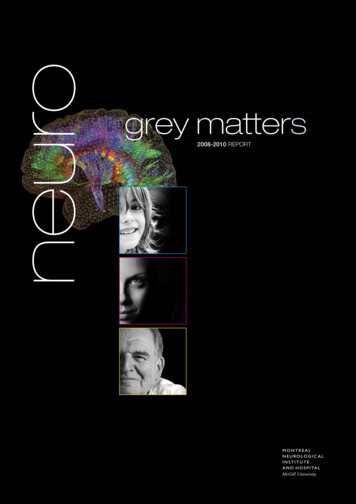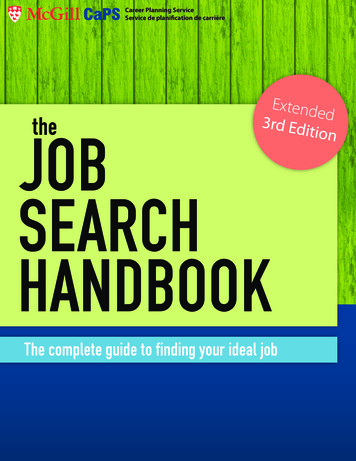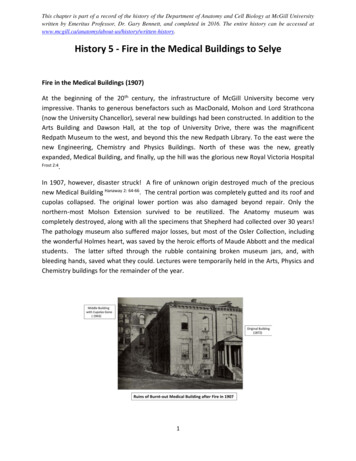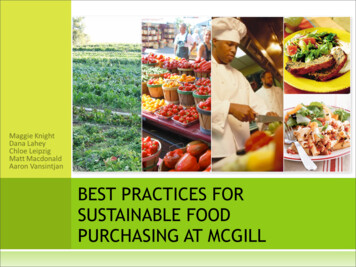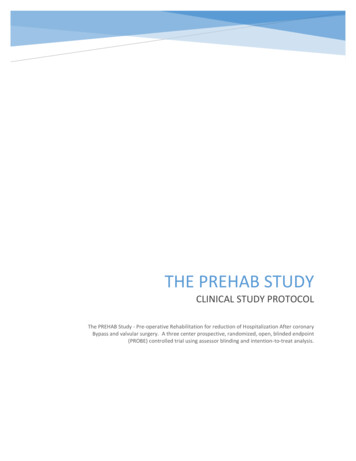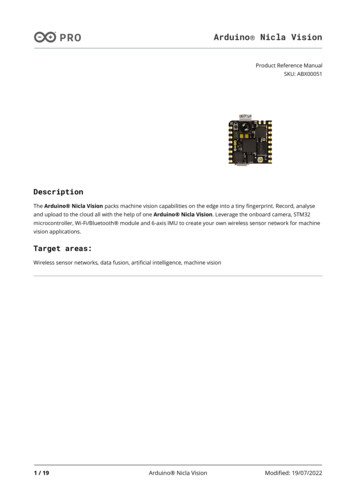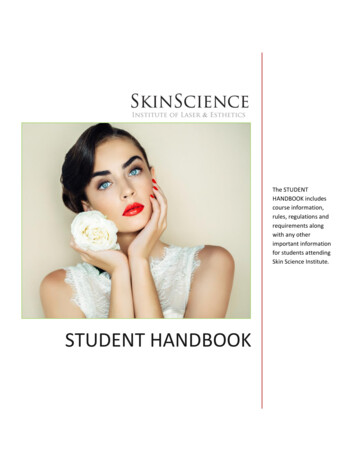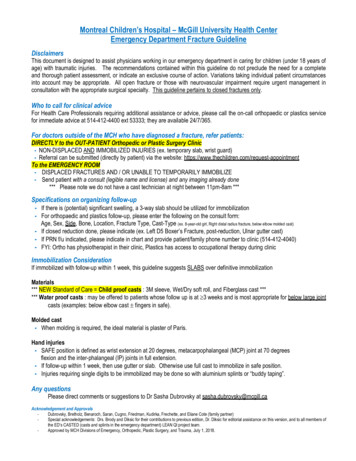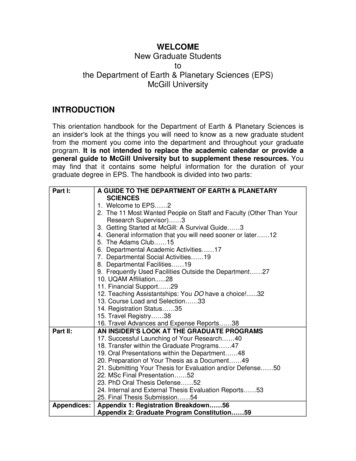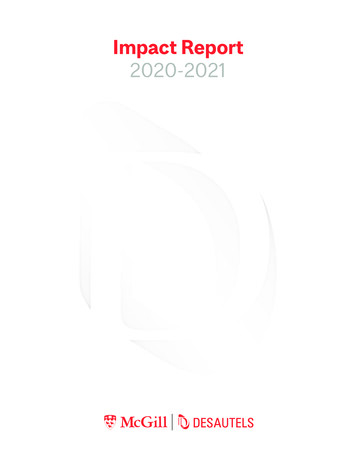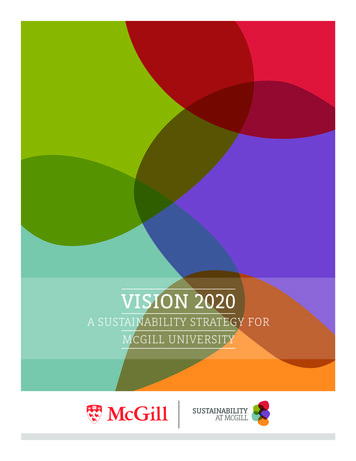
Transcription
VISION 2020A SUSTAINABILITY STRATEGY FORMCGILL UNIVERSITY
“MCGILL UNIVERSITY ASPIRESTO ACHIEVE THE HIGHEST POSSIBLESTANDARDS OF SUSTAINABILITY ONITS CAMPUSES AND IN ITS DAY-TO-DAYACTIVITIES THROUGH ITS ACADEMICPRACTICES, IN ITS FACILITIES ANDOPERATIONS, AND BY ITS OUTREACHTO THE BROADER COMMUNITY.”MCGILL SUSTAINABILITY POLICY, 2010
A WORD FROM THE PRINCIPALWelcome to McGill University’s Sustainability Strategy. It is a signal of our commitment to a shared vision forsustainability—a vision for the community, from the community.Through conversations and consultations across the University—including the Vision 2020 initiative—the McGillcommunity has made clear its aspirations, its priorities. This is a time of great challenges and opportunity, and weare embracing both with an awareness of the important role that new knowledge plays in building cultural, social andeconomic well-being.Sustainability is a priority for McGill. The Sustainability Strategy reflects the progress that has already been madeand addresses the challenges ahead. We have set ambitious goals and I am confident that our drive, our talent—andour engagement, within the University and beyond—will allow us to succeed.Suzanne FortierPrincipal and Vice-ChancellorWHY A SUSTAINABILITY STRATEGY?This strategy fulfills a directive of McGill’s Sustainability Policy (2010), which calls for “a sustainability plan with specific goals and objectives”. It alsoprovides a conceptual framework that may informand support the future application of guidingdocuments at McGill that integrate sustainabilityas a priority — e.g., Achieving Strategic AcademicPriorities (2012), the Strategic Research Plan (2013),the Master Plan Principles Report (2008), the Procurement Policy (2013), and the Student ServicesCore Values & Goals.VISION 2020: A SUSTAINABILITY STRATEGY FOR MCGILL UNIVERSITY1
EXECUTIVE SUMMARYSustainability at McGill has come a long way in the past several years. TheMcGill Sustainability Strategy emerged out of a need to coordinate andscale up the sustainability initiatives already underway at the university,and to provide a framework for future endeavours. In alignment with theMcGill Sustainability Policy (2010) and the product of extensive communityengagement, the Sustainability Strategy presents one enduring vision forsustainability at McGill, 23 long-term goals, and 14 priority actions for theperiod 2014-2016. The goals and actions are presented across five categories: Research, Education, Connectivity, Operations, and Governance &Administration. The Sustainability Strategy will be updated in 2016 toinclude new priority actions.McGill’s two campuses are located in downtown Montreal and Sainte-Anne-de-Bellevue, Quebec.Both are on the traditional territory of the Kanien’kehá:ka (Mohawk).2VISION 2020: A SUSTAINABILITY STRATEGY FOR MCGILL UNIVERSITY
CONTENTS1A WORD FROM THE PRINCIPAL2EXECUTIVE SUMMARY4INTRODUCTION5BENCHMARKING OUR SUSTAINABILITY PERFORMANCE7DEFINING SUSTAINABILITY8FIVE CATEGORIES OF SUSTAINABILITY AT MCGILL9DEVELOPING THE STRATEGY10THE SUSTAINABILITY STRATEGY11MCGILL’S SUSTAINABILITY ONS20GOVERNANCE & ADMINISTRATION22MOVING FORWARD23CONCLUSIONVISION 2020: A SUSTAINABILITY STRATEGY FOR MCGILL UNIVERSITY3
INTRODUCTIONWhat role will McGill University play in creating a future where both people and the planet can flourish? How canwe, as an institution, as a community, and as individuals, move toward that more sustainable future?The answers to these questions can be glimpsed in many places around McGill’s campuses. Some of us catchsight of them as we discover Quebec-grown food in the cafeterias, or when we tackle real-world problems in classroomsdesigned for collaboration. Others see them when renovation projects enable creative energy savings or research equipmentis purchased with lifecycle costs in mind. And many see the less tangible sustainable developments—connections andrelationships—being created by diverse groups of students, faculty, and staff who congregate to relax and learn after classesor push together for positive change.Sustainability is not a new concept for McGill. Grassroots action, paired with administrative support, has been akey driver of progress and policy changes since the 1990s. Yet, until recently, many sustainability initiatives lacked a senseof connection, shared purpose, and broader support. Sustainability priorities have been emergent, actions have beendecentralized, and progress has occurred in the absence of an over-arching strategy for and from the whole universitycommunity.This is changing. In the past several years, McGill’s students, staff, and faculty have worked together to establishMcGill’s Office of Sustainability, create the flagship Sustainability Projects Fund, and adopt a comprehensive SustainabilityPolicy. Over this period, there has been a groundswell of projects and initiatives around sustainability, spanning McGill’sdowntown campus in the heart of Montreal, our Macdonald campus in Sainte-Anne-de-Bellevue, and the networks thatconnect us with communities near and far.The people behind sustainability initiatives on campus are working harder than ever to address the full scopeof sustainability—social, economic, and environmental—while honouring and connecting with the efforts of manyothers. As momentum builds, many are beginning to see themselves as part of a loosely woven movement that spans societal and professional boundaries. Perhaps most importantly, sustainability is gradually being recognized as fundamentalto McGill’s mission and value in society.There remains, however, a lot of ground to cover. And so while the Sustainability Strategy has emerged as a resultof a slow culture shift, it is also presented as a catalyst for its quickening. With no time to lose and an enormous amountof work to be done, this strategy will provide an important touchstone for progress on sustainability in the coming years.Developed by the McGill community as one element of an ongoing community engagement process, the vision, goals, andactions included here were written with the aim of integrating, institutionalizing, and scaling up the culture of sustainabilityat McGill. Here we go.4VISION 2020: A SUSTAINABILITY STRATEGY FOR MCGILL UNIVERSITY
BENCHMARKING OUR SUSTAINABILITY PERFORMANCEBefore developing this strategy, McGill completed a comprehensive Situational Analysis 1 to benchmark our sustainability performance relative to peers and best practices. The primary framework used to assess McGill’s performance — theAASHE STARS 2 framework — is the most widely endorsed system for tracking sustainability at universities in NorthAmerica. McGill earned a rating of mid-range silver when it reported to AASHE STARS for the first time in 2012.Based on these results, it would be easy to conclude that McGill’s sustainability performance is in the middle of thepack. Generally speaking, this is true. However, digging a little deeper reveals a more complex story. In some areas, McGillis setting the bar — for example with the 840,000 per year Sustainability Projects Fund, the campus food system, andefforts to green and pedestrianize the campuses. However, in other areas we lag substantially behind our peers — forexample in energy efficiency and green buildings.To better understand McGill’s sustainability performance, it is important to keep in mind that context matters—theareas where McGill is leading and lagging are deeply tied with the culture and characteristics of McGill as an institution. Wehave 37,000 students hailing from 150 countries, administer approximately 500 million of research funding, and operateroughly 200 buildings, 82 of which were built before 1940. We have a working farm, a UNESCO Biosphere Reserve, and amain campus that is located at the centre of a multicultural, multilingual metropolis where the mean temperature in Julyis 35 degrees Celsius higher than the mean temperature in January. Though we will strive to do better across the board, asustainable future will look different at McGill than it would at another university.The vision, goals, and actions laid out in the Sustainability Strategy are consistent with the scope of sustainability measured by the AASHE STARS framework, and progress toward our own goals can be expected to translateinto an improved AASHE STARS rating. It is important to keep in mind, however, that earning a Gold AASHE STARSrating is not a goal in and of itself; rather, it is an indicator that we are making progress toward the sustainable future wehave articulated for ourselves. It is also worth recalling that benchmarking isn’t everything—some of the most importantaspects of sustainability are among the most difficult to measure, and sustainability is not a competition among institutions. It is an ongoing challenge to learn to live equitably within the limits of a finite planet.1 Vision 2020: A Situational Analysis. 2012.Available: a.sustainability/files/mcgill situational analysis.pdf2 The Association for the Advancement of Sustainability in Higher Education (AASHE) has developed the Sustainability Tracking,Assessment & Rating System (STARS) for universities to measure their sustainability performance. Available: https://stars.aashe.org/VISION 2020: A SUSTAINABILITY STRATEGY FOR MCGILL UNIVERSITY5
More than 80% of McGill’s staff and students commute using active or public transit,and the downtown campus became car-free in 2010.6VISION 2020: A SUSTAINABILITY STRATEGY FOR MCGILL UNIVERSITY
DEFINING SUSTAINABILITYIn October of 1987, Our Common Future, also known as the Brundtland Report, was published by the World Commissionon Environment and Development, and the term sustainable development was officially defined:“Sustainable development is development that meets the needs of the present without compromising the ability of futuregenerations to meet their own needs.” 3Since this influential beginning, sustainability has shed its explicit connection to development and expanded into aninterdisciplinary dialogue on social, economic, and ecological wellbeing.4 The rich diversity of contemporary approaches to sustainability, however, means that a universally-agreed upon definition of the word remains elusive. While basicprinciples, such as the consideration of interconnected systems over longer time scales, are common across the board,actions are often tailored to local scenarios. As with other relative concepts such as beauty or democracy, the concept ofsustainability requires interpretation within a given context.Here at McGill, the Sustainability Policy (2010) asserts that the mission of the University “will be attained responsiblyby carrying out its activities in a manner that achieves a balance between the social, economic and environmental dimensions of sustainability.” With this in mind, we can define sustainability for our purposes as working together toward ashared vision for a flourishing future in a manner that integrates social, economic, and environmental dimensions.These dimensions form the foundation of the vision, goals, and actions that make up this strategy, and are well alignedwith the norms established by organizations such as the Association for the Advancement of Sustainability in HigherEducation5 and the Global Reporting Initiative.6Seeking to situate this general definition within a local context, the Vision 2020 process essentially crowd-sourceda more nuanced understanding of what sustainability means for McGill. When asked to envision a sustainable future,McGill’s students, staff, faculty and administrators answered with the ideas presented here.They also identified five categories of sustainability. These provide a framework for addressing the work we’redoing here, and reflect the five key areas in which a university can make a positive difference within society:Research Education Connectivity Operations Governance & Administration3United Nations. 1987. Our Common Future; The World Commission on Environment and Development.Available: conspect.nl/pdf/Our Common Future - Brundtland Report 1987.pdf456Adams, W.M. 2006. The Future of Sustainability: Re-thinking Environment and Developmentin the Twenty-first Century. Available: www.iucn.orgAASHE defines sustainability “in an inclusive way, encompassing human and ecological health, social justice,secure livelihoods, and a better world for all generations.” Available: www.aashe.orgSustainability reporting consists of measuring, understanding, and communicating an organization’s “economic,environmental, social and governance performance.” Available: www.globalreporting.orgVISION 2020: A SUSTAINABILITY STRATEGY FOR MCGILL UNIVERSITY7
FIVE CATEGORIES OF SUSTAINABILITY AT MCGILLResearch: This category encompasses the ‘what’, ‘why’, ‘how’ and ‘who’ of research at McGill, and considers researchactivities conducted both on campus and elsewhere.Education: This category focuses on student, staff, faculty, and institutional learning.Connectivity: This category emphasizes the need for strong connections, both within McGill and with the local and globalcommunities of which we are a part.Operations: This category encompasses the physical activities that support the ongoing functioning of the University.Governance & Administration: This category addresses how the University is managed in terms of people, funding andfinance, decision-making, and process implementation.Finance & Investment Human Resources Diversity & Equity Accessibility Transparency Accountability Experimentation Leadership Living Lab Food Systems Material Flows Transportation Energy Water Land RESEARCHGOVERNANCE &ADMINISTRATIONEDUCATIONOPERATIONSCONNECTIVITY Applied Student Research Social & Ecological Footprints Interdisciplinarity Partnerships Collaboration Exploration Knowledge & Experience Practical Skills Engaged Dialogue Lifelong Learning Citizenship Wellness & Health Community Engagement Knowledge Sharing Sense of Belonging Creative Spaces InclusivityThrough a process of community engagement, five categories and their related themeswere identified as key to sustainability at McGill.8VISION 2020: A SUSTAINABILITY STRATEGY FOR MCGILL UNIVERSITY
DEVELOPING THE STRATEGYThe Vision 2020 process through which this strategy was developed has been led by McGill’s Office of Sustainability(MOOS) and funded by the Sustainability Projects Fund. The process was guided by a multi-stakeholder steering committee 7and supported by a core project team.The contents of the Sustainability Strategy, however, come from the McGill community. Since February 2012, overone thousand McGill community members have contributed their visions and action ideas to this process throughmore than twenty public events, dozens of presentations, and online. Students, staff, and faculty were engaged in countlessconversations, world-café style discussions, flash consultations, one-on-one interviews and working groups to imagineand plan for a more sustainable McGill.8 The engagement process neither intended to nor succeeded in reflecting everyvoice in the McGill community, but care was taken to talk with and listen to a diverse cross-section of McGill stakeholders.9This strategy emerged from those conversations, which have been distilled into one vision, 23 goals, and 14 priorityactions for sustainability at McGill. Many other action ideas were discussed over the course of Vision 2020, and itis expected that these will inform the development of the next iteration of the Sustainability Strategy (2016-2018). It isimportant to note that many actions not currently reflected in the Strategy will also be pursued over the coming years.A groundswell of sustainability projects is currently underway, with students, staff, and faculty actively working togetheron every scale to foster positive changes at the University. Continuing to connect with, support, and learn from theseindividuals and groups will be crucial to the development of sustainability at McGill.Nevertheless, and despite our best intentions, two years from now one or more of the actions listed here may stillbe on the “to do” list. Conditions change and flexibility will be needed as we adapt to them. Our challenge is to stay rootedin our vision and goals for sustainability while continually seking skillfull approaches to getting there.VISION 2020’S PRINCIPLES OF ENGAGEMENTInclusive of the McGill communityReceptive to existing knowledgeHolistic in approach to engagement and recognizing the valuable roles played by everyoneAdaptive to lessons learned along the wayTransparent in decision-making and prioritizing7 See the McGill Office of Sustainability website for a complete list of the Steering Committee members.Available: a.sustainability/files/2013-2014 vision2020 steeringcommittee.pdf8 See Appendix A of the Vision 2020 draft Vision and Goals Report (2013) for more details on the engagement process.Available: a.sustainability/files/2013-03-01 draft sustainability vision goals rev.pdf9For reflections and lessons on how Vision 2020 did and didn’t live up to its principles, see the Vision 2020 Impact Report and Failure Report.Available: a.sustainability/files/impact report s/mcgill.ca.sustainability/files/failure report final.pdfVISION 2020: A SUSTAINABILITY STRATEGY FOR MCGILL UNIVERSITY9
THE SUSTAINABILITY STRATEGYIn crafting the Sustainability Strategy, the Vision 2020 core team and Steering Committee have sought to balancerealism and ambition, asking both “Is this possible?” and “Is this enough?”The vision of the Strategy is ambitious. It describes a desired future state and sets a long-termdirection for McGill’s sustainability efforts.The goals are equally ambitious but more specific and detailed.10The actions ground us in the present day. They ask: what can we do in the next two years (2014-2016)to move one more step toward our vision and goals?Many members of the McGill community have already signed on to specific actions as partners, demonstratinga growing momentum toward sustainability and also the distributed responsibility that characterizes the movement.A companion document to the Sustainability Strategy— titled “Priority Action Briefs 2014-2016” describes each action inmore detail and lists the partners involved in implementing actions.The actions and partners are slanted toward the administrative side of the University. This is intentional — the groupslisted here play vital roles in shaping the policies, practices, and culture of McGill. The priority actions, as presented here,fall squarely within their mandates. The sustainability vision and goals, however, belong to everyone. The section entitled“Moving Forward” (page 22) touches on the many ways individuals, units, faculties, and others can help move McGilltoward the sustainability vision and goals presented here.1010The vision and goals are intended to guide direction, not set policy. Any programmatic changes inspired by these goalsin the future will be submitted to and vetted by the relevant approval bodies as they are developed.VISION 2020: A SUSTAINABILITY STRATEGY FOR MCGILL UNIVERSITY
MCGILL’S SUSTAINABILITY VISION*McGill recognizes and embraces the unique responsibility of universities to support societies in their transition toward sustainability.We generate the knowledge needed to create a more sustainablefuture. We cultivate citizens and leaders who have the skills and commitment to put that knowledge into practice. This is one of the leading placesin North America to study and learn about sustainabilty.McGill — as an institution and a community—“walks the talk” of sustainability in all that we do. Our decisions and actions reflect our role as partof nature and our duty to current and future generations and the planet.Our campus community is diverse, caring, and inclusive — a place wherepeople and ideas flourish.At McGill, we strive to be one of the best universities in the world bydoing our best for the world.*The vision and goals describe a desired future.They are written in the present tense to make that future easier to imagine.VISION 2020: A SUSTAINABILITY STRATEGY FOR MCGILL UNIVERSITY11
RESEARCH VISION FOR 2020 *A rich diversity of research is conducted at McGill by faculty, students,staff and community partners. We value both curiosity-driven andproblem-oriented research for their ability to generate knowledge andcontribute to society. Recognizing the interconnected nature of complexlocal, regional and global issues, we collaborate across disciplines toinform and advance solutions to contemporary problems. We are awareof and responsible for the environmental, economic and social implicationsof our research.Photo: McGill’s world-leading green chemistry research group seeks to find benign alternativesto the harmful substances used in and produced by many chemical reactions.*This vision is closely aligned with the vision advanced in McGill’s Strategic Research Plan 2013-2017and ASAP 2012: Achieving Strategic Academic Priorities.12VISION 2020: A SUSTAINABILITY STRATEGY FOR MCGILL UNIVERSITY
RESEARCHWE WILL KNOW WE HAVE ACHIEVED THIS WHENTHE FOLLOWING GOALS ARE MET McGill recognizes and supports research that informs and advances solutions to sustainability challenges. McGill actively facilitates collaborative research in sustainability both within disciplines and across disciplinary boundaries. T he social, economic and environmental impacts of all research activities undertaken by or on behalf of McGill areconsidered in advance and negative effects are minimized.PRIORITY ACTIONS FOR 2014-2016 T hrough a consultative process, develop a working definition of “sustainability research” and map the presence of suchresearch at McGill (Action 1). Develop a networking platform to facilitate collaborative sustainability research (Action 2). Develop and implement a Sustainable Labs program aiming to foster sustainability in labs (Action 3).See the document “Priority Action Briefs 2014-2016” for more detail on these actions.14This vision is closely aligned with McGill’s Sustainability Policy (2010) and Physical Master Plan (2008).VISION 2020: A SUSTAINABILITY STRATEGY FOR MCGILL UNIVERSITY13
EDUCATION VISION FOR 2020 *McGill is a truly student-centered institution and one in which the learning of faculty, staff, and community partners is also actively supported.We learn together and from each other, in and out of the classroom, tobecome engaged citizens. Where appropriate, concepts of and strategiesfor sustainability are integrated into our programming, pedagogy andassessment, equipping McGill’s students and staff with the skills, values,experiences, and perspectives to address the grand challenges of the21st century.Photo: Students involved in the Macdonald Student-Run Ecological Garden get hands-on experiencein everything from vegetable production to business management.*This vision is closely aligned with the vision advanced in ASAP 2012: Achieving Strategic Academic Priorities (2012).It is also congruent with reports of the McGill Inquiry Network and the mandate of theUndergraduate Learning Outcomes working group (2012-2014).14VISION 2020: A SUSTAINABILITY STRATEGY FOR MCGILL UNIVERSITY
EDUCATIONWE WILL KNOW WE HAVE ACHIEVED THIS WHENTHE FOLLOWING GOALS ARE MET McGill’s student experience cultivates citizenship and leadership both inside and outside the classroom. M cGill’s academic, administrative and support staff are supported in their professional development and encouraged tobe lifelong learners. McGill graduates have acquired skills that equip them to work across disciplinary, sectoral and cultural boundaries. M cGill graduates have practiced translating classroom knowledge to complex real-world situations through an appliedlearning experience. McGill graduates understand what sustainability means, why it is important and how it relates to their fields of study.PRIORITY ACTIONS FOR 2014-2016 Identify and facilitate opportunities for applied student research that advances sustainability (Action 4). D evelop a program in which small groups of faculty members are identified each year as Faculty Fellows inSustainability (Action 5).See the document “Priority Action Briefs 2014-2016” for more detail on these actions.14This vision is closely aligned with McGill’s Sustainability Policy (2010) and Physical Master Plan (2008).VISION 2020: A SUSTAINABILITY STRATEGY FOR MCGILL UNIVERSITY15
CONNECTIVITY VISION FOR 2020 *The fabric of the McGill community is strong, and so are our ties with theinterconnected communities into which we are woven, from local to global.All members of the McGill community feel welcome, valued, relevantand informed—recognizing themselves as integral participants in thecampus community. McGill as a whole values its important role beyondthe campus, and is connected with and responsive to Montreal, Quebec,Canada and the world. Strong relationships, accessible information andmultidirectional listening and learning are the norm.Photo: The student-led Farm-to-School project helps local elementary studentsget their hands dirty while learning where their food comes from.*This vision is closely aligned with the recommendations of the Principal’s Task Force on Diversity, Excellence andCommunity Engagement (2011). It is also congruent with the Strategic Research Plan and ASAP (2012).16VISION 2020: A SUSTAINABILITY STRATEGY FOR MCGILL UNIVERSITY
CONNECTIVITYWE WILL KNOW WE HAVE ACHIEVED THIS WHENTHE FOLLOWING GOALS ARE MET M cGill supports the health and happiness of students, faculty and staff, and facilitates their integration into the McGillcommunity. C ommunity engagement — within and beyond McGill — is valued as a core element of the McGill student, staff andfaculty experience. McGill sustains many strong, reciprocal relationships with partners in local, regional and global communities. K nowledge flows freely in all directions — within McGill, from McGill to the communities to which we belong and fromthose communities to McGill.PRIORITY ACTIONS FOR 2014-2016 Renovate underused indoor and outdoor spaces on campus to transform them into community gathering spaces (Action 6). C ollaborate with the City of Montreal and other partners to redevelop McTavish Street into a pedestrian-friendly corridorthat showcases best practices in sustainable urban planning and serves as a center of community activity (Action 7).See the document “Priority Action Briefs 2014-2016” for more detail on these actions.VISION 2020: A SUSTAINABILITY STRATEGY FOR MCGILL UNIVERSITY17
OPERATIONS VISION FOR 2020 *Acknowledging the finite limits of the planet, we have re-oriented all activitiescarried out by or on behalf of McGill to minimize their impact and maximizetheir contribution to resilient, just and flourishing human and ecologicalsystems. We recognize that this is a responsibility shared by all members ofthe McGill community—individuals, units, departments and organizationsacross McGill understand and embrace the role that they play. We considerall activities in light of their life cycle and in light of the question, “Is thisreally needed?” Operations at McGill are closely integrated with research andeducation as a mutually beneficial system that encourages adaptation andimprovement.Photo: McGill’s cutting-edge Bellini Life Sciences Complex was certified LEED Gold in 2012.Sustainable features include a green roof, rainwater capture system, and heat recovery system.*This vision is closely aligned with McGill’s Sustainability Policy (2010) and Physical Master Plan (2008).18VISION 2020: A SUSTAINABILITY STRATEGY FOR MCGILL UNIVERSITY
OPERATIONSWE WILL KNOW WE HAVE ACHIEVED THIS WHENTHE FOLLOWING GOALS ARE MET R enewable energy sources supply the vast majority of McGill’s energy needs and McGill is progressively increasingthe share of its energy coming from renewable sources while minimizing non-renewables. All products and services purchased by McGill are sustainably-sourced. Z ero waste (energy, water, solid, air) is the target for all activities at McGill. This target is aggressively pursued andimprovement is continuous. McGill’s natural and built environment supports resilient ecosystems, strong communities and individual well-being. M cGill’s operations serve as a “living lab” that fosters learning for staff and students through close and mutuallybeneficial integration with education and research. Experimentation and adaptation are encouraged and lessons areshared within and beyond McGill.PRIORITY ACTIONS FOR 2014-2016 A dopt McGill green building standards that incorporate the LEED credit system and aim to achieve at least LEEDSilver for all major construction and renovation projects (Action 8). Implement the Sustainable Procurement Strategic Action Plan (Action 9). C onduct a campus waste assessment and developa waste action plan (Action 10). Develop an energy action plan (Action 11).See the document “Priority Action Briefs 2014-2016”for more detail on these actions.VISION 2020: A SUSTAINABILITY STRATEGY FOR MCGILL UNIVERSITY19
GOVERNANCE & ADMINISTRATION VISION FOR 2020 *All decisions at McGill are made and implemented with a sustainable futurein mind. The way we function as an institution and a community matchesthe values we hold, and supports the commitment McGill has made to sustainability. This can be seen in our recruitment, evaluation, financial portfolioand resource allocation, as well as in our decision-making. Our institutionalstructures are flexible, adaptive, and inclusive, nurturing innovation, equityand the development of
VISION 2020 : A SUSTAINABILITY STRATEGY FOR MC GILL UNIVERSITY 1 . or when we tackle real-world problems in classrooms . McGill's Office of Sustainability, create the flagship Sustainability Projects Fund, and adopt a comprehensive Sustainability Policy. Over this period, there has been a groundswell of projects and initiatives around .
